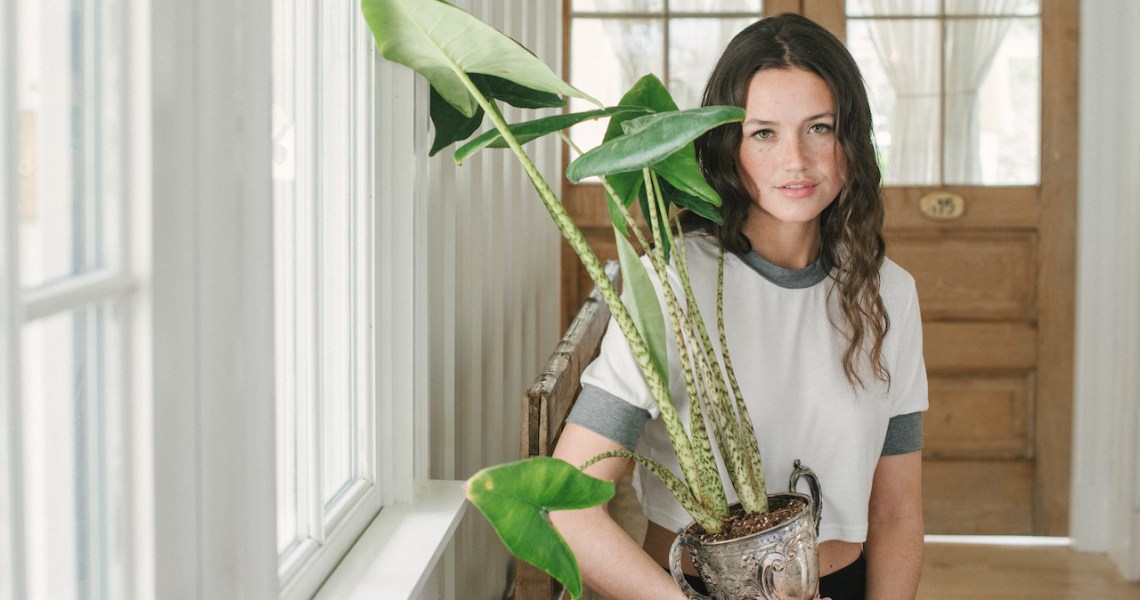Cannabis is starting to infiltrate fashion.
Across the beauty industry, CBD products and brands are flooding the market. Fashion, on the other hand, has been slow to hop on the cannabis bandwagon. The exception has been brands, including Levi’s and Patagonia, incorporating hemp, a strain of the cannabis sativa plant. Now fashion brands are exploring CBD, too.
Last week the very first CBD-infused women’s activewear company, Acabada, launched with a limited-edition drop. The first collection includes CBD-infused leggings for $160, and jackets and jumpsuits for $250. Each product contains zer0 THC and up to 25 grams of 99.9% pure CBD. Founder and CEO Seth Baum said that after the Farm Bill passed, he wanted to create hemp-based activewear, but soon found a manufacturer that could micro-encapsulate CBD into apparel. When the clothing is worn and moved around in, the micro-capsules in the apparel that are infused with CBD open and release the active ingredient (CBD) to aid with muscle recovery — in the same vein as slathering on a CBD lotion or another topical product for the same effect.
“As more people become aware of the benefits of CBD, especially related to recovery, we think our market will continue to grow and we really won’t have to explain to them what CBD does. That’s a very attractive part of our proposition,” said Baum.
The CBD-infused fabric is placed strategically on the products to align with major muscle groups. Sports bras, for example, have roughly four grams of CBD and are designed to target the upper back, while leggings have 10 grams of CBD and target quads, calves and hamstrings.
“The biggest trick was really finding a factory that was able to produce this. We were looking for something very high-end and high-quality. One of our must-haves was we wanted everything to be done sustainably. We picked recycled materials, and we wanted to work with a factory that uses renewable energy and really had a low carbon footprint,” said Baum.
A downside to the product though, for those looking for something long-lasting, is that after 40 high-use wears and washes, the CBD infused into the products will start to wear out. Customers have the option to sustainably recycle their garments by sending them back to Acabada and receive 30% off their next purchase. The brand will take those garments and repurpose the fabrics for commercial use.
“Cannabis is still federally illegal in the U.S., so we haven’t had the kind of research that we would like to see. If we had the research, we could identify different ways to use the different cannabinoids and maybe they could last longer than 40 washes. We’re still at the beginning and have no idea what could happen next,” said Marji Chimes, CMO of THC-infused edibles, topicals and concentrates company Coda Signature.
For many using hemp in their clothing, it’s all about creating products more sustainably, with materials that will last longer, as fashion grapples with its contribution to textile waste.
In late 2018, a provision in the Agriculture Improvement Act of 2018 (also known as the Farm Bill) made way for farmers to grow and harvest hemp for industrial purposes. Hemp doesn’t use any pesticides or synthetic fertilizers, and requires very little water, making it an ideal fabric for designers aiming to shift into more sustainable practices. Industrial hemp is slated to become a $13 billion industry by 2026, per a report from Reports and Data.
For fashion brands, the legalization of hemp meant an opportunity to think more seriously about sustainable practices and materials. Kathryn Hilderbrand founded Good Clothing Company, an ethical, sustainable and small batch manufacturing facility based in Massachusetts, in 2015. She spent seven years fighting for the legalization of hemp alongside fashion guru Tim Gunn, and focused more on turning her in-house clothing line clothing line, Good Apparel, to be more hemp-derived tied to the passing of the Farm Bill.
“My motive with using hemp is that it’s just responsible. Anything and everything that grows from the ground, that does not pollute the water, that is dyed responsibly, sourced responsibly — those are the fibers that we are using. I don’t care how much they cost,” said Hilderbrand. The hemp-derived capsule collection debuted in July. Three out of the six items have sold out and have not yet been restocked. However, the brand does typically restock when its other products (made with organic cotton, bamboo and other sustainable materials) sell out.
“The point of this brand is to help women build a closet that is timeless, with pieces that continuously work together. You’re not replacing what you have each season with this new season, but you’re adding to it. We don’t want you to buy a million of everything, we only want you to buy a few things,” she said.
Perhaps the biggest sign that big fashion companies are taking note of the world of cannabis is its presence at New York Fashion Week. This year, designer and Project Runway alum Korto Momolu is hoping to use her runway show, featuring mostly hemp-based designs, to address some of the stigmas tied to cannabis. The designer is partnering with Women Grow, a women’s networking group serving the cannabis and hemp industries to help promote the collection.
“When you think about fashion and cannabis, the examples of hemp in clothing are the most obvious connections,” said Chimes.
For example, in March, Barney’s opened a cannabis lifestyle shop in its Beverly Hills location called The High End. It’s also available online. The shop was created to not only sell cannabis accessories like lighters and pipes, but also edibles and CBD vape pens. It also has a range of accessories like sunglasses and bracelets emblazoned with cannabis leaves.




